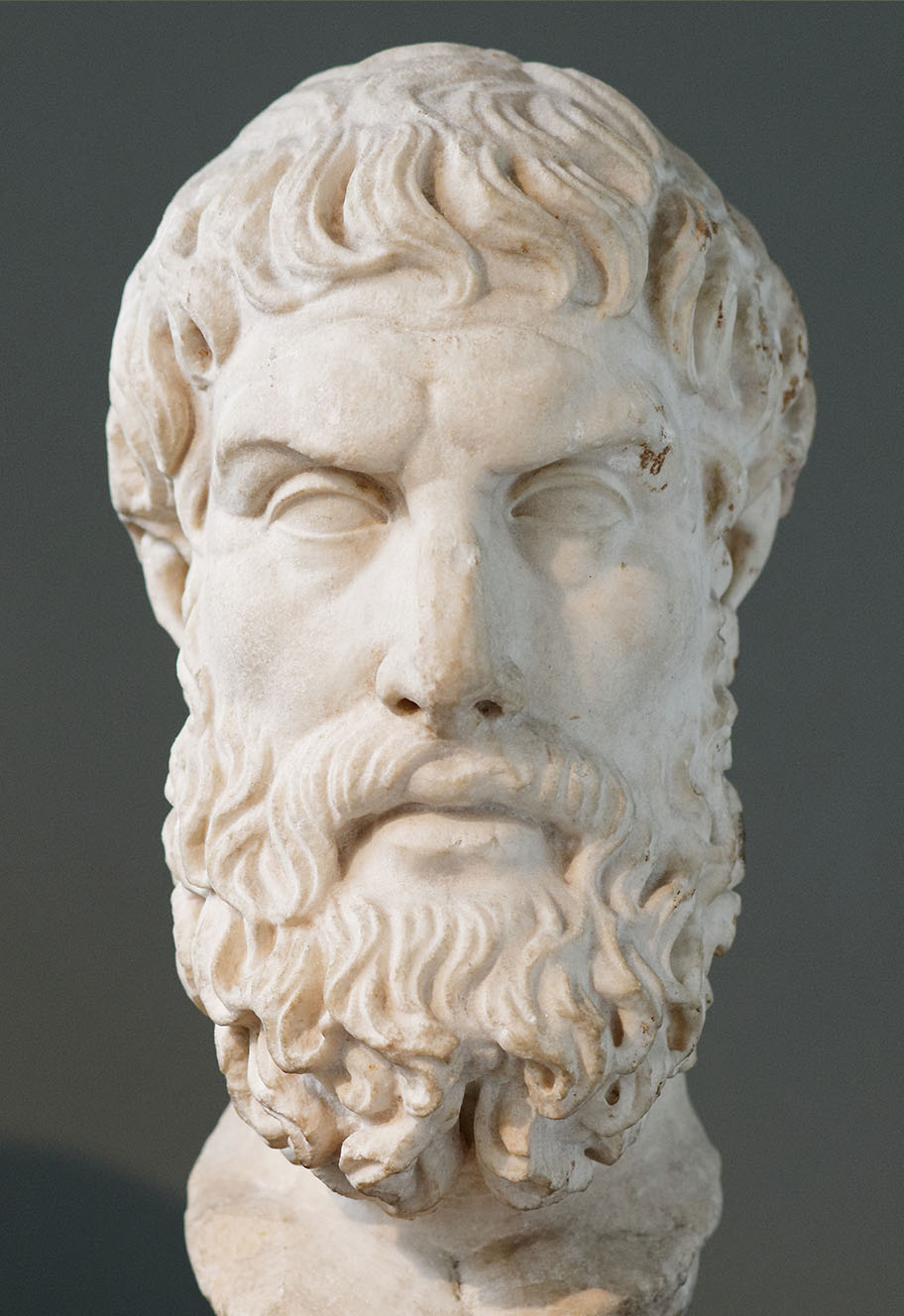Epicurus
Born:
341 BCE
Died:
270 BCE
Epicurus was an ancient Greek philosopher who founded the school of philosophy known as Epicureanism. His teachings focused on achieving a life of tranquility and happiness through pursuing simple pleasures, avoiding pain, and cultivating philosophical wisdom. Here are key aspects of Epicurus's life and philosophy:
Life and Background: Epicurus was born on the island of Samos in 341 BCE. He later established his philosophical school in Athens, known as "The Garden," where he taught and wrote. He lived during a time of philosophical richness in ancient Greece and was influenced by earlier philosophers, including Democritus.
Philosophical Foundation: Epicureanism is primarily concerned with ethics and the pursuit of a happy life. Epicurus emphasized the importance of individual well-being, asserting that the ultimate goal of life is to achieve tranquility and freedom from mental and physical pain (ataraxia and aponia). Unlike hedonism in its popular sense, Epicureanism sought not excessive pleasure but rather the avoidance of unnecessary desires and pains.
The Tetrapharmakos: Epicurus encapsulated his ethical principles in the Tetrapharmakos, or "Four-part Remedy," which consists of four principal doctrines guiding a life of tranquility. These are:
- "Don't fear god": The divine does not interfere with human affairs.
- "Don't worry about death": Death is the end of consciousness, and there is no need to fear it.
- "What is good is easy to get": The essentials for happiness are simple and easily obtained.
- "What is terrible is easy to endure": Many feared things are not as bad as they seem, and enduring difficulties leads to greater strength.
Atomic Theory: Epicurus adopted the atomistic philosophy of Democritus, positing that all matter is composed of indivisible particles called atoms. According to Epicurus, the arrangement and motion of these atoms determine the properties of substances.
Social Contract: Epicurus advocated for a simple and self-sufficient life. He believed that communal living with like-minded individuals in a community (like "The Garden") contributed to the pursuit of happiness and tranquility. Friendships and social relationships were important to Epicurus, and he considered them essential for a pleasurable life.
Legacy: Despite being criticized by other philosophical schools, Epicureanism gained popularity in the Hellenistic and Roman periods. The Roman poet Lucretius wrote "De Rerum Natura" ("On the Nature of Things"), a didactic poem that expounded Epicurean philosophy. Epicureanism continued to influence later philosophers, and its ideas were revived during the Renaissance.
Death: Epicurus died in Athens in 270 BCE.
Epicurus's philosophy sought to provide practical guidance for individuals seeking a life of contentment and tranquility. His emphasis on the pursuit of modest pleasures, friendship, and the avoidance of unnecessary desires has left a lasting impact on ethical thought. It continues to be studied and debated in philosophical circles.

Quick Facts
- Epicurus founded the school of philosophy known as Epicureanism.
- His teachings focused on achieving a life of tranquility and happiness through pursuing simple pleasures.
- Epicurus emphasized the importance of individual well-being and the avoidance of unnecessary desires and pains.
- The Tetrapharmakos encapsulates Epicurus's ethical principles in guiding a life of tranquility.
- Epicurus adopted the atomistic philosophy of Democritus, positing that all matter is composed of indivisible particles called atoms.
Further Reading
Art &
Architecture
Ancient Greek art and architecture, with its harmonious proportions and timeless elegance, continue to inspire awe and admiration millennia later.
Discover
Greek Mythology & Mythical Characters
Greek mythology, a rich tapestry of gods, heroes, and mythical creatures, captivates the imagination with its tales of love, betrayal, and epic adventures that delve into the depths of the human psyche.
Discover
Ancient Greek History
Ancient Greek history, marked by remarkable achievements in democracy, philosophy, and warfare, shaped the foundation of Western civilization, leaving an indelible legacy of innovation and cultural influence that continues to resonate to this day.
Discover
Ancient Greek Olympics
The ancient Greek Olympics, held in Olympia every four years, celebrated athleticism, unity, and cultural pride, serving as a testament to the enduring spirit of competition and excellence that transcends time and borders.
Discover
Ancient Greek Wars
Ancient Greek wars, such as the Persian Wars and the Peloponnesian War, were pivotal conflicts that shaped the course of history, highlighting the struggle for power, independence, and the clash of civilizations in the ancient Mediterranean world.
Discover
Ancient Greek Culture and Society
Ancient Greek culture and society, characterized by its emphasis on art, philosophy, and civic engagement, fostered a vibrant intellectual and social landscape where innovation flourished, democracy thrived, and the pursuit of knowledge and excellence was celebrated as fundamental values of civilized life.
Discover